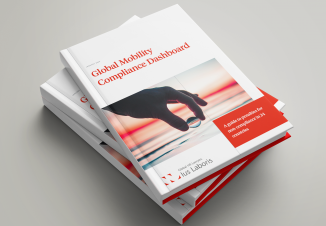
1. GUIDANCE
1.1 Has any guidance been issued on how UK nationals can obtain settled residence status and permission to work from 1 January 2021 and what proof of residence is needed for current residents to maintain their status?
and permission to work and what proof of residence is needed for current residents?
Yes.
Nevertheless, holding a residence document issued under the Free Movement Directive is not decisive of a UK national’s status as beneficiary of the WA. Τhe non-registration and the non-issuance of a document provided for in the Greek Presidential Decree 106/2007 before the end of the transition period does not exclude UK nationals and their family members from the scope of the WA. However, in this case, they are required to prove by other means that they exercised their right to reside in Greece in accordance with EU law before the end of the transition period and continue thereafter.
2. BUSINESS TRAVEL
2.1 Do UK employees need a business visa from 1 January 2021?
It depends on the period of stay.
In view of Brexit, the EU and its 27 Member States have reviewed the Visa Regulation to provide for the inclusion of the UK, after its withdrawal from the EU, in the list of countries that enjoy a visa-free regime in the EU, for short-term stays and visits. This allows British citizens to visit any EU country for tourist or business purposes, visa-free, for 90 days within an 180-day period.
Further exceptions from the requirement for a work/residence permit are applicable under 4.1 to 4.6 of the SERVIN (service industries) Annex to the Trade and Cooperation Agreement between the EU and the UK.
Third-country nationals coming to stay and work in Greece for more than 90 days require a national visa as well as (usually) a corresponding residence permit for employment and business purposes. The type differs depending on the type of work involved. The same applies for the required documents. For more details about the types of national visa and residence permit for employment and business purposes see 3.3 below.
2.2 What documents are needed on arrival for business travel from 1 January 2021?
UK nationals need a national identity card or a valid passport which was issued within ten years preceding the date of travel and which remains valid for at least three months after the intended date of departure from the EU. UK citizens’ family members who are not EU citizens are required to provide a valid passport.
In accordance with article 14 of the WA, five years after the end of the transition period, the host State may decide to stop accepting national identity cards for the purposes of entry to or exit from its territory if these cards do not include a chip that complies with the applicable International Civil Aviation Organisation standards related to biometric identification.
2.3 Do UK nationals need additional permission to work for business travel from 1 January 2021?
Regarding UK nationals falling under the personal scope of the WA, UK citizens holding a residence permit with the annotation ‘article 18 (4) of WA’ or ‘Permanent Residence’ and their family members have full market access.
In accordance with article 24 paragraph 3 of the WA, employed frontier workers enjoy the right to enter and exit the state of work and retain the rights they enjoyed as workers there, provided they are in one of the following circumstances (points (a), (b), (c) and (d) of Article 7(3) of Directive 2004/38/EC) apply, even where they do not move their residence to the state of work:
For UK nationals not falling within the personal scope of the WA, see 2.1 above and 3.1 below.
3. EMPLOYMENT AND RESIDENCE
3.1 Do UK nationals need permission to work and stay in Greece from 1 January 2021?
Yes.
UK nationals need to apply for a residence permit or just a national visa in the event of temporary residence, unless they can rely on an exemption such as:
3.2 If permission to work is needed after 1 January 2021, do any quotas apply to the employment of third-country nationals?
Yes.
Quotas are established in a joint ministerial decision issued by the Ministers for the Interior, Foreign Affairs, Development & Competitiveness, Shipping & The Aegean, Labour, Social Security & Welfare.
This decision is issued during the last quarter of every other year and determines the maximum number of paid employment posts offered to third-country nationals per region and speciality.
However, the SERVIN (service industries) Annex to the Trade and Cooperation Agreement states that parties to it cannot impose numerical quotas on entry and temporary stay, on business visitors for establishment purposes in specific sectors, on intra-corporate transferees, on contractual service suppliers and on independent professionals of the other Party.
3.3 If permission to work is needed from 1 January 2021, what categories of permission are commonly granted?
Greek Immigration Law 4251/2014 provides for a residence permit for employment and business purposes for five categories:
There is also provision for temporary residence with a national visa for several categories of employment such as:
3.4 If permission to work or stay is needed from 1 January 2021, how long does the procedure take?
Greek legislation provides for a four-month period for the issuance of the permits unless there is a different, specific provision. When it is decided that additional supporting documents are needed, the competent service notifies the applicant to submit the documents within a reasonable period of time that cannot exceed two months. Please note that due to the high number of third-country nationals residing in Greece and the relative migration flows, it has often appeared challenging for the competent authority to issue residence permits within the above period. However, it is important to underline that when applying for the issuance of a residence permit, the competent authorities provide the applicants with a certificate of receipt (blue paper), which permits the third-country national to lawfully stay and work in Greece until the authority issues the residence permit.
3.5 If permission to work and stay is needed from 1 January 2021, what Government fees are payable?
Fees range depending on the type of residence permit and its duration. For instance, the fee amounts to EUR 150 for residence permits up to one year and EUR 600 for residence permits up to ten years.
4. FRONTIER WORKERS
4.1 What formalities apply to UK frontier workers working in Greece but living in another country from 1 January 2021?
UK frontier workers will need to submit an application to the appropriate Greek authorities to request a new document that certifies that they are frontier workers protected by the WA.
5. PERMANENT RESIDENCE
5.1 From what date are third-country nationals entitled to apply for permanent residence?
In order to obtain permanent residence, a third-country national needs to complete five years of consecutive stay in Greece (subject to conditions).
6. SECURING RESIDENCE AND WORK STATUS
6.1 What steps could UK nationals take currently to secure their residence and work status?
UK nationals who benefit from the WA may apply for a ten-year residence permit if they already hold permanent residence in Greece, otherwise they can apply for a five-year residence permit. The starting date for the submission of applications for these residence permits is 1 January 2021 and the closing date for their submission is 30 June 2021.
UK nationals and their family members, who are also citizens of the UK can submit an application for a residence permit to the competent Greek authorities. The starting date for the submission of applications is 1 January 2021 and the closing date is 30 June 2021. Applicants must be careful to provide all necessary documents along with biometric data.
UK nationals can apply for Greek citizenship if conditions are met.
UK nationals can request family reunification with an EU national, if conditions are met.


